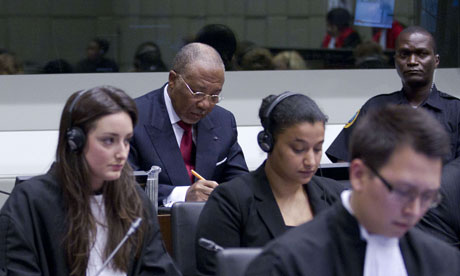Liberia's inability to judge its people has led to an international court convicting its former president of aiding war crimes.

Former Liberian president Charles Taylor waits for the start of the judgment hearing of his trial. Photograph: Peter Dejong/AFP/Getty Images
For far too long, dictators and warlords who have inflicted extensive atrocities on the African people have gone unpunished. This is true when one looks at the scale of crimes against humanity committed across the continent in the recent past in places such as Sudan, Rwanda, the Democratic Republic of the Congo, Liberia and Sierra Leone.
But this record of impunity is changing, thanks to the long arm of international justice. Increasingly, Africans suspected of committing crimes against humanity are under investigation by the international criminal court and a few have already been charged and are awaiting trial. International intervention has far-reaching implications on the continent, especially regarding governance and reform of judicial systems.
On Thursday Charles Taylor, warlord turned president of Liberia, was convicted of aiding and abetting war crimes by the Sierra Leone special court in The Hague. The court was established in 2002 to try those who bore the greatest responsibility for crimes against humanity during the prolonged conflict in Sierra Leone. Taylor was convicted in connection with offences including murder, rape, sexual slavery and using child soldiers. It was alleged that Taylor was responsible for these crimes through his support of rebels fighting in Sierra Leone. The prosecutor alleged that Taylor was personally responsible for these crimes because he was involved in the planning, instigating and commissioning but the court found him not guilty of direct personal responsibility for the atrocities carried out by rebels.
Taylor's conviction is significant. First, the successful conviction of a man whose accession to the top public job in Liberia had been achieved through a savage and vicious war in which his troops engaged in an orgy of violence that resulted not only in the abuse of the human rights of many Liberians, but also in the massacre of many of them, augurs well for the development of a peaceful and just dispensation in the country.
Second, Taylor's conviction reinforces the fact that no one, even those elites who serve in the government, including the executive and members of the judiciary and legislature, is above the law – the law is supreme.
Third, that justice had to come from international courts does not reflect well on Africans and Liberia in particular. The process exposes the failure by Liberians to provide themselves with a legal and judiciary system capable of effectively administering justice. Taylor committed his crimes in Liberia and he should have been brought to justice by his own people in domestic courts. However, this was not possible given the country's failure to provide a system capable of dealing fully and effectively with Taylor's subversion of justice.
Fourth, Taylor's successful prosecution informs future Liberian, and indeed African, dictators and tyrants that they cannot escape justice by hedging their bets on a dysfunctional domestic legal system. Where national systems are incapable of adequately and effectively prosecuting leaders who engage in wanton violations of human rights, citizens can look to the international criminal court for justice.
With the Taylor affair concluded, Liberians must now insist on and devote their efforts to providing themselves with institutional arrangements that promote democracy, stability, human rights, sustainable development and social justice. Specifically, the country must provide itself with a constitution that guarantees the just rule of law – under such a system, no one, even imperial presidents and military men with their own armies, is above the law. Hopefully, a new and fully reconstituted legal system, one obtained through a bottom-up, participatory and inclusive institutional reform process, would allow Liberians to bring anyone who violates the law, including even those who are politically well connected, to justice.
Finally, the verdict and the process should be a wakeup call to Africans. The successful conviction for such crimes is a glaring example of the failure of Africans to govern themselves effectively. That the international criminal court has to be used to deal with issues that we as Africans should be able to deal with is a demonstration of our collective failure. That we have to rush to The Hague for others to solve our problems is probably the best example of abuse of our political independence. If anything, Africans must focus on building strong institutions to deal with human rights violations ourselves, else we should not claim to be independent and instead should let others define and enforce the rules.
• Mwangi Kimenyi is senior fellow and director, and John Mbaku is non-resident senior fellow, Africa Growth Initiative, the Brookings Institution
Culled from theguardian.co.uk
No comments:
Post a Comment